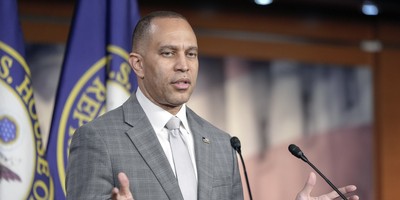Unless you’ve been living in Abbottabad, you’ve probably noticed the price of gasoline is rising almost as fast as our national debt. How our government spends our money and how we decide to power our economy are two of the most pressing challenges facing our country. Despite the clear and present dangers presented by both challenges, elements of the Washington Establishment are still taking a business-as-usual approach.
When it comes to pain at the pump, we’re perilously close to breaking the record high set in July of 2008. If you will recall, the following months were none too pleasant; and with weak employment data and rising concerns over a double-dip in the housing market, Americans are understandably anxious. A new CNN poll found more than 80% of Americans believe the economy is in poor shape.
Nonetheless, many on the political left are floating the same discredited ideas they’ve pursued for the past several decades: drive down domestic oil production by increasing regulations and increasing taxes.
Folks on the other side of the aisle understand stifling domestic oil production only exacerbates our current problems, which stem from a combination of deliberate policy decisions made in Washington coupled with predictable international trends. Last week, the House of Representatives passed HR1280, which would expand and expedite offshore energy production.
Unfortunately, Members on both sides of the aisle are still enamored with subsidies. Take HR1380, the New Alternative Transportation to Give Americans (NAT GAS) Act of 2011. The legislation gives preferential tax treatment – i.e. subsidizes – for the production, purchase and use of natural gas vehicles. When is the last time a government subsidy did anything besides distort the market and favor the politically connected?
Recommended
Nonetheless, the bill has 180 co-sponsors, split between Republican and Democrat. Surprisingly – and unfortunately – a few very solid conservatives signed on, along with more than a handful of big-government liberals. Despite the message sent by voters last November, these folks are acting like members of the Washington Establishment: “if it’s a technology I like, it’s okay to give it a little boost.”
Earlier this year, Heritage Action and dozens of other organizations called for an end to energy subsidies. Among other things, the letter was explicit on tax subsidies: evenly apply lower taxation across the board. Period. Lowering the effective level of taxation on one energy source, but not another, skews the playing field. In that regard, this is no different than tax breaks for wind mills, solar panels and ethanol.
During a committee hearing last week, Congressman Mike Pompeo (R-KS) said he wants natural gas to succeed, but the “NAT GAS Act is the latest example of a systemic problem in Congress whereby we pick winners and losers in the energy markets” and called it “wrong for the future of our country.”
If America is to be prosperous, increased domestic energy production is necessary. At the same time, as conservatives, we must stand on principle and ensure we do not resort to big-government tactics to achieve our goals.
When it comes to America’s rising debt and the need to cut spending, the direction is much clearer. However, it is once again incumbent upon conservatives – and any American who is concerned with the future of this country – to stand on principle and force Members of Congress to take bold action.
In the coming months, America will reach its statutory debt ceiling and be prohibited from borrowing more money. A request to raise the debt ceiling by another $2 trillion should serve as an alarm bell; and the increasingly dire situation – see S&P’s warning – demands lawmakers in Washington take bold action.
There is good news and bad news on this front.
The good news is that lawmakers on both sides of the aisle appear to agree we cannot simply raise the debt ceiling without taking some additional action – spending cuts or reforms or both. The bad news is that many, including some of the more established elements in the Republican Party, are downplaying their ability to achieve significant reductions and reforms in exchange for raising the debt ceiling.
Negotiating with yourself, especially in public, is a poor strategy that frequently leads to embarrassing outcomes. Politics aside, our country cannot afford an embarrassing outcome when the stakes are this high. Rhetoric and timidity do not spawn American prosperity; yet, that is precisely what some are advocating.

























Join the conversation as a VIP Member